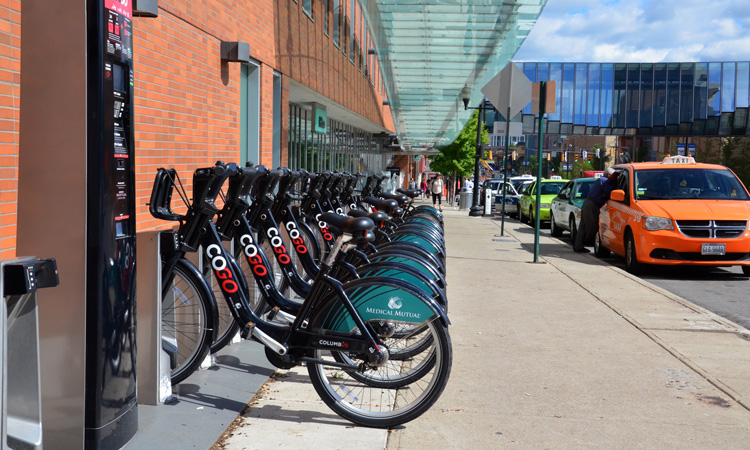
[ad_1]
Smart Columbus has launched a mobility hub project, a connected vehicles and road safety project, and has re-commissioned an all-electric self-driving shuttle pilot to deliver food to communities in need.

CoGo rental bikes are part of the Smart Mobility Hubs project in Columbus.
City of Columbus Mayor Andrew J. Ginther joined community leaders for the unveiling of three Smart Columbus projects that will pilot new mobility technology to serve the needs of the community.
Smart Mobility Hubs, Connected Vehicles, and the re-commissioned Linden LEAP seek to improve mobility, road safety, and community food support. The projects are funded by the $40 million grant awarded to Columbus, the winner of the 2016 Smart City Challenge, by the U.S. Department of Transportation (USDOT).
“Columbus won the Smart City Challenge because we had the vision and ambition to try new mobility technologies in a neighbourhood to address the daily challenges residents face,” said Mayor Ginther. “Today, that vision comes to life. These mobility pilots in Linden will bring food to neighbours in need, connect residents to reliable and affordable mobility options, and help vehicles travel through the neighbourhood more safely. I invite Linden to try the services we’ve designed for and with you, and to share your experiences, so that these technologies can help neighbourhoods like yours throughout our community and the country.”
“As the region’s mobility solutions provider, COTA is proud to partner with Smart Columbus to bring more transportation options directly to these neighbourhoods and help connect people to social and economic prosperity. COTA is committed to never letting transportation be a barrier to opportunity,” said Central Ohio Transit Authority (COTA) Chief Innovation Officer, Sophia Mohr.
Smart Mobility Hubs
Smart Mobility Hubs have been created to aggregate multi-modal first mile/last mile solutions at accessible locations throughout the community to make travelling easier and more affordable. Mobility options at each Hub are unique to that location and include different combinations of CoGo conventional and e-bikes, scooter parking and charging docks, EV charging, ride-hail pick/up drop off points, and dockless scooter, bike, and car share parking.
“The Smart Mobility Hubs are a great example of the Columbus community living forward to turn today’s dreams into better tomorrows,” said Brian Ross, President and CEO of Experience Columbus. “By helping residents get their needs met during COVID-19, making it easier for our residents to explore within their own backyards and helping visitors easily traverse the city when travel resumes, this technology will be crucial in helping restore the city’s economy.”
Connected Vehicles
Smart Columbus is seeking 500 community volunteers interested in having connected vehicle technology installed in their personal vehicles. The equipment will provide real-time safety alerts intended to help drivers make more informed decisions while en-route to their destination.
The seven-month study is designed to understand the impact of the technology on driver safety. The study will look specifically at anonymous data collected from vehicles travelling along Cleveland Ave. between 2nd Ave. and Morse Rd., High St. between 5th Ave. and Morse Rd., and Morse Rd. between High St. and Stygler Ave.
Participants will be eligible for up to $315 in incentives for completing regular surveys about the programme. Volunteers must be over 18 and drive at least three times per week within the study corridor.
In addition, Smart Columbus is seeking up to 10 individuals interested in becoming a “Connected Vehicle Technician In-Training” during the study. Participants will complete a paid training course and be placed at a local site to install the connected vehicle technology in public and private vehicles.
“Advanced vehicle technology like connectivity is increasingly becoming standard on new vehicles,” said Columbus City Council Member and Public Service Chair, Shayla Favor. “Through this study, we hope to not only keep drivers safer on our streets, but also create an immersive training experience that will help our local auto shops and technicians learn the ins and outs of this new technology with future applications in our cars and on our roadways.”
Re-launch of Linden LEAP
To assist with the critical distribution of food, the Linden LEAP, an all-electric self-driving shuttle, is being recommissioned to transport pre-packaged food boxes from St. Stephen’s Food and Nutrition Center to the Rosewind Community Center. A trained operator will be on board, but no riders will be permitted due to coronavirus social distancing requirements.
“We have seen an unprecedented need for food during the current pandemic. About 20 per cent of those in need do not have transportation to our centre and the nearest bus stop is half or three quarters of a mile away,” said Marilyn Mehaffie, CEO of St. Stephen’s Community House. “The Linden LEAP will help bridge the transportation gap, providing food at Rosewind.”
Pilots will run through March 2021, with reporting provided to the USDOT and published via the Smart Columbus website in May 2021.
[ad_2]
Source link